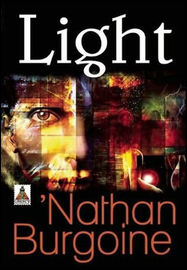Wheeler’s Law of Reasonable Expectations dictates that if an author is well-known for his bittersweet romantic stories, his novels will follow along the same lines. ‘Nathan Burgoine’s Light, however, obliterates that law. And that’s not a bad thing. In fact, there is little, if anything, bad about this stunning debut, which makes my job as a reviewer both easier and more difficult at the same time.
Kieran Quinn is a gay massage therapist, but that’s where the stereotype ends. He also has telekinetic powers, which is good for our side. Bad for our side is that the enemy, embodied by Stigmatic Jack (leader of the Church of the Testifying Prophet) also has a telekinetic it can use for its nefarious purposes. During one eventful Pride week, Kieran and Jack square off for some monumental battles. Who wins? And what of Kieran’s lust for a hot leatherman named Sebastien? How about Kieran’s brother’s lust for Karen, his boss at the spa? And who is the Miracle Woman?
Burgoine answers these questions and more in a stylistic tour de force that is as much superhero story as it is a light romance (which, at its core, Light is–complete with HEA). What’s stunning about this debut is its assurance. In terms of character, plot, voice, and narrative skill, Burgoine knocks it out of the park as if this was his tenth book instead of his first. He, along with Tom Cardamone, has the considerable gift of being able to ground the extraordinary in the ordinary so that it becomes just an extension of everyday life. Kieran Quinn is, indeed, a superhero (despite the fact that he hates the names the public gives him–Rainbow Man, Light, Disco?), but he’s a superhero who loves his cat, who blithers in the presence of handsome men, and who goes on failed blind dates.
Knowing Burgoine’s short fiction as well as I do, I was floored to discover his facility with action sequences. There are four encounters with the villain, each increasing in complexity and scope to the climactic final one, and all four were totally engaging and had me on the edge of my figurative seat. I was more confident in predicting the romance, which is written in a clever, light ‘n’ breezy manner with an undercurrent of danger. Burgoine’s dialogue , especially between Kieran and Sebastien, shines. It’s banter-ish without sounding forced–the kind of dialogue I always imagined happened in Jean Kerr’s house. Or maybe even Erma Bombeck’s. And Kieran’s voice is totally entertaining–that of a genuinely nice guy with just enough smart ass to give his observations some punch.
Burgoine’s prose is clean and focused, his characters are sharply defined, and his plot runs a fairly straight line–with one neat little twist–to its conclusion, which is immensely satisfying. What more could you ask from a debut? This is the difficult part of my job, where I’m supposed to come up with a negative or two to counter all the strokes. And I really can’t think of anything worth mentioning. Perhaps four or five books in, when he starts taking chances that don’t work , there’ll be something to point at…wait, maybe I found one: He could have written it so that it was easier to put down.
As far as negatives, that’ll have to do.
© 2013 Jerry L. Wheeler


